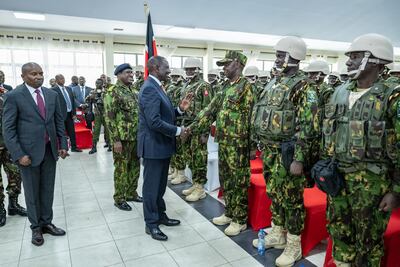The first UN-backed contingent of foreign police arrived in Haiti on Tuesday, nearly two years after the troubled Caribbean country urgently requested help to quell a surge in gang violence.
A couple of hundred police officers from Kenya landed in the capital of Port-au-Prince, where the main international airport reopened in late May after gang violence had forced it to close for nearly three months.
On Monday, Kenyan President William Ruto held a departure ceremony for 400 officers who will be the first contingent to arrive in Haiti.
"This mission is one of the most urgent, important and historic in the history of global solidarity. It is a mission to affirm the universal values of the community of nations, a mission to take a stand for humanity," Mr Ruto said.
The Kenyans will face violent gangs that control 80 per cent of Haiti’s capital and have left more than 580,000 people across the country homeless, as they pillage neighbourhoods in their quest to control more territory.
Gangs also have killed several thousand people in recent years. Two of these were an American Christian missionary couple who were kidnapped in Port-au-Prince and later killed.
The Kenyan police are expected to be joined by officers from Jamaica, the Bahamas, Barbados, Chad and Bangladesh, which together will form a 2,500-strong peacekeeping mission.
The police force's arrival marks the fourth major foreign military intervention in Haiti. While some Haitians welcome their arrival, others view the force with caution, given that the previous intervention – the UN’s 2004-2017 peacekeeping mission – was marred by allegations of sexual assault and the introduction of cholera, which killed nearly 10,000 people.

Meanwhile, the UN Integrated Office in Haiti issued a brief statement welcoming the Kenyans' arrival, calling it a "crucial step in the fight to restore security in the Haitian capital and its surroundings and protect the rights of Haitians".
The Kenyans’ deployment comes nearly four months after gangs launched co-ordinated attacks on government infrastructure in Haiti’s capital and beyond, seizing control of more than two dozen police stations, firing on the main international airport and storming the country's two biggest prisons, releasing more than 4,000 inmates.
Critics say the gang attacks which began on February 29, could have been prevented if the foreign force had been deployed sooner, but setbacks including a legal challenge filed in Kenya and political upheaval in Haiti delayed its arrival.
The co-ordinated attacks achieved their objective: preventing then-prime minister Ariel Henry from returning to Haiti. At the time, he was in Kenya to push for the deployment of the force, but he resigned in late April amid the surge in gang violence.
Mr Henry was installed as prime minister after the assassination of his predecessor Jovenel Moise and had grown deeply unpopular, with Haitians angry that elections have not been held in almost a decade.
Instability in the country surged after Mr Moise's 2021 assassination.
A nine-member transitional presidential council has been formed, headed by former UN official Garry Conille.
"The people of Haiti deserve to feel safe in their homes, build better lives for their families and enjoy democratic freedoms," US President Joe Biden said in a statement.
"Haiti’s future depends on the return to democratic governance. While these goals may not be accomplished overnight, this mission provides the best chance of achieving them."
The US is providing about $109 million for the mission. In addition to the situation in Haiti affecting regional security, the number of Haitians attempting to claim asylum in the US has risen sharply over the past few years.
US authorities encountered Haitians at the border with Mexico about 53,900 times in 2022 and more than 76,100 times last year, according to the Migration Policy Institute.
"We have also worked with other governments to vet their personnel for the mission, and we will continue to engage and vet personnel that are going to participate in the mission, because obviously, it's important that the human rights of the Haitian people be respected as this mission to restore law and order is carried out," US State Department spokesman Matthew Miller said.
